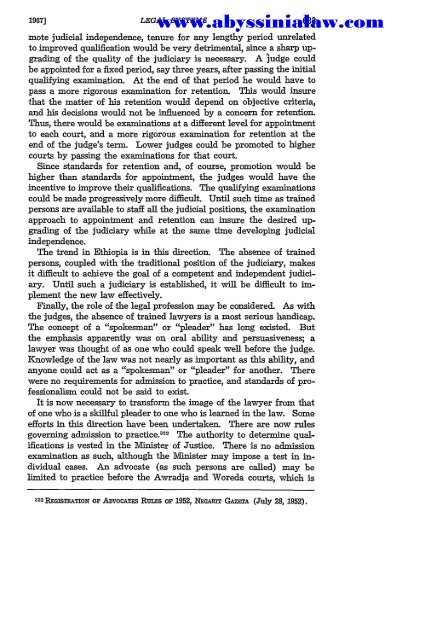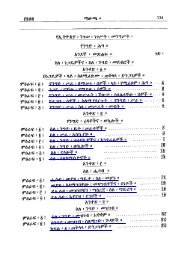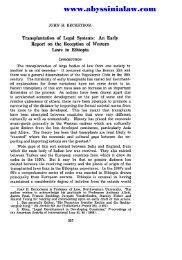Create successful ePaper yourself
Turn your PDF publications into a flip-book with our unique Google optimized e-Paper software.
LEGAL SYSTEMS<br />
mote judicial independence, tenure for any lengthy period unrelated<br />
to improved qualification would be very detrimental, since a sharp upgrading<br />
of the quality of the judiciary is necessary. A 3udge could<br />
be appointed for a fixed period, say three years, after passing the initial<br />
qualifying examination. At the end of that period he would have to<br />
pass a more rigorous examination for retention. This would insure<br />
that the matter of his retention would depend on objective criteria,<br />
and his decisions would not be influenced by a concern for retention.<br />
Thus, there would be examinations at a different level for appointment<br />
to each court, and a more rigorous examination for retention at the<br />
end of the judge's term. Lower judges could be promoted to higher<br />
courts by passing the examinations for that court.<br />
Since standards for retention and, of course, promotion would be<br />
higher than standards for appointment, the judges would have the<br />
incentive to improve their qualifications. The qualifying examinations<br />
could be made progressively more difficult. Until such time as trained<br />
persons are available to staff all the judicial positions, the examination<br />
approach to appointment and retention can insure the desired upgrading<br />
of the judiciary while at the same time developing judicial<br />
independence.<br />
The trend in Ethiopia is in this direction. The absence of trained<br />
persons, coupled with the traditional position of the judiciary, makes<br />
it difficult to achieve the goal of a competent and independent judiciary.<br />
Until such a judiciary is established, it will be difficult to implement<br />
the new law effectively.<br />
Finally, the role of the legal profession may be considered. As -with<br />
the judges, the absence of trained lawyers is a most serious handicap.<br />
The concept of a "spokesman" or "pleader" has long existed. But<br />
the emphasis apparently was on oral ability and persuasiveness; a<br />
lawyer was thought of as one who could speak well before the judge.<br />
Knowledge of the law was not nearly as important as this ability, and<br />
anyone could act as a "spokesman" or "pleader" for another. There<br />
were no requirements for admission to practice, and standards of professionalism<br />
could not be said to exist.<br />
It is now necessary to transform the image of the lawyer from that<br />
of one who is a skillful pleader to one who is learned in the law. Some<br />
efforts in this direction have been undertaken. There are now rules<br />
governing admission to practice. 2 2 1967] www.abyssinialaw.com<br />
The authority to determine qualifications<br />
is vested in the Minister of Justice. There is no admission<br />
examination as such, although the MVinister may impose a test in individual<br />
cases. An advocate (as such persons are called) may be<br />
limited to practice before the Awradja and Woreda courts, which is<br />
322 REGIsTRATIoN Or ADVOCATEs RULES OF 1952, NEGA=T GAzmA (July 28, 1952).





